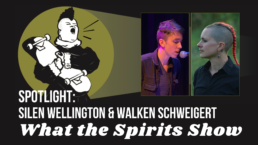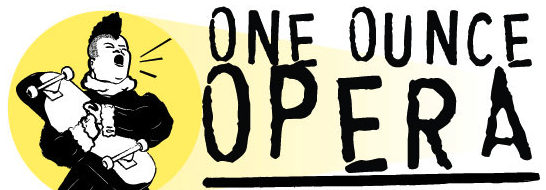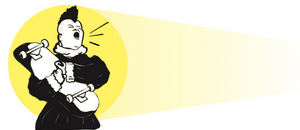Get to know Composer Silen Wellington & Librettist Walken Schweigert, creators of What the Spirits Show, which was originally commissioned by the prestigious American Opera Initiative at the Kennedy Center's Washington National Opera. This is its regional premiere.

Often the most poignant and powerful dialogue happens between those who create and those who perform. That’s why OOO connects our singing-artists with the composers and librettists selected for the 6th Annual Fresh Squeezed Ounce of Opera.
So if you’re curious about the musical themes, story inspiration, what to listen for, and more, you’re in the right place.
Here, enjoy insights about What the Spirits Show, written by Silen Wellington & Walken Schweigert – with questions from the cast – sure to enhance your FSOO experience.
First a quick synopsis:
Calamus is a teenage artist with a fantastical imagination and endless curiosity. Rather than easels or clay, Calamus’ canvas is their own body. With the aid of a magic elixir, Calamus shapeshifts, expressing their true spirit by bending into different forms and offering the poetry of transformation. But when a tyrannical politician criminalizes such elixirs, Calamus’ world is on the brink of destruction, and they will need all their strength to bend the arc back towards justice…
Why did you opt for a more fantastical setting instead of real life/realism? Does it offer another layer to the story of these genderqueer folx and their plight?
Walken: I have so many answers to this question! I will say first that I am not super interested in realism. In my work, I am always looking for the truth that facts point to, but poetics reveal. I wanted to tell a story that was more universal, that each audience member could contextualize based on their own experience. I wanted to speak to the spiritual side of queerness. I wanted to explore how the knowledge about our transness, as it relates to our authenticity, is spiritual knowledge. Because of that, it felt necessary to have magic to be a part of this world, which felt easier to contextualize in 20 minutes if we were never trying to achieve realism to begin with. In the work, I didn't want to talk about gender explicitly. I wanted to talk about the power of knowing who you are in the face of bigotry, and I wanted to celebrate that power and show its strength. Also, by it happening nowhere identifiable it situates it as happening everywhere, which also felt appropriate.
Silen: Compositionally, I'm often interested in how music can create worlds. In bringing the magic of this world to life, leaning into the fantastical & lush textures of Calamus' magic felt like a way to illustrate the spirituality I feel in my transgender experience, and also to illustrate the bigger story of how magic it is when we embrace who we are.
Is there a reason why Sylvan does not also take the magic elixir as someone who is also gender non-conforming? Is it a choice or because ze can’t use it like Cal can?
Walken: Silen and I wanted to be careful not to essentialize the trans experience. We wanted to be sure that we were not positioning Cal to be a symbol for all trans people. Not all trans people take hormones, and yet we can all be in solidarity in the recognition that we all need different things in our transitions. So it felt important to represent that. Transition looks different for all of us, but the bigotry threatens us all. This makes it incredibly important for us to be in solidarity with each other, regardless what part of the trans experience is being attacked. We can see this in the escalation of the anti-trans legislation over the past few years. It began by focusing on HRT for minors, then included HRT for adults, then social transition for minors and now bills are being proposed with the intention of erasing trans people from public life entirely. So, in regards to Sylvan, the answer is quite simple: ze simply doesn't feel a need for the elixir, but is willing to put zir life and freedom on the line for someone who does.
Silen: This is captured for us in Sylvan's line, "What they're doing to you, they would do to me too." Sylvan not only fights for Calamus because Cal is zir's friend, but because Sylvan recognizes the injustice Calamus faces will inevitably impact zir entire community.
How do you see/imagine the spirits and what they represent? Are they ancestral? Ethereal? Elemental?
Walken: Yes! All of the above! In contrast to the rigid, authoritative monotheism presented by the Politician, I wanted Cal to be coming from a totally different spiritual context and world view. For Cal, the whole world, all of reality, is alive with spirit/spirits including Cal themself.
The morning after my gender affirmation surgery, I saw myself in the mirror as an adult for the first time. Meaning: I suddenly realized that the person I had been looking at for the last 20 years had not been me. It was only now, post surgery, that I was my adult self. This realization floored me. How did I know? How did I know, when so many people told me I was crazy, that this surgery was what was necessary to be who I truly am? Certainly what I had gone through was a physical transformation, but it wasn't just physical. It was mental and emotional, but not just those things either...
Slowly, so slowly it dawned on me that perhaps what I was going through was a spiritual transformation, and perhaps the knowledge of who I am is spiritual knowledge. I'm still trying to figure out what that means, and the writing of What the Spirits Show was a part of that. In the opera, I am trying to describe how the experience felt for me, which also meant trying to get a grasp on my own spirituality. I had flung aside all religion when I came out as trans as a teenager and was rejected by my Catholic parents. So, as an adult in his 30s, I found myself wrestling with how to comprehend the spiritual experience of my surgery and had no framework to help me do that. In my discovery of the Reclaiming tradition of witchcraft, I found a polytheistic worldview (and a broader understanding of spirit than what I had been exposed to in my Catholic upbringing), that helped me understand what I was going through. This opera is a part of my own personal, internal exploration of that spiritual perspective.
I want to also lift up the work of theologian Dr. Justin Sabia-Tanis who I found out later has written about this very idea (that knowledge of one's gender is spiritual knowledge), which I also think is a really elegant way to subvert the nature/nurture argument and many other bigoted beliefs about transness in general.
Silen: For me, being queer and transgender has often meant reaching for a future vision of myself I had no blueprint for. It meant stepping into unknown places with a faith and conviction that my life would feel more true once I did. When I first began questioning my gender identity, I would hear voices entering women's restrooms, asking me "Are you a woman? Are you a woman?Areyouawoman?" And I felt terrified, because that question would unravel everything in my life that I knew and everything in my life that I didn't know. But just on the other side of that question was an unfettered joy I didn't know existed because for so long, I'd strived for only ordinary contentment. I didn't know for sure if answering that question would make anything better about my life, but with what I now can only describe as a spiritual conviction, I knew I had to move through that question.
Transition has often felt like a leap of faith. Medical transition involves some changes I like and some changes I don’t like, but in crossing these thresholds, I learn more about myself and who I need to be. After taking testosterone for a while, after my voice had dropped but before I started growing facial hair, I felt scared because I didn't know if I wanted to have a beard or venture into becoming "cis-passing." In grappling with that decision, it was through rituals, trances, meditations, that I met a future version of myself — fully bearded, who held me and beamed with self love. It wasn't that I knew I was going to become that beardly self, or that I necessarily needed to look that way to love myself, but by seeing that vision, I could move forward with my choices about medical transition trusting that no matter what happened, I would learn how to love myself.
Even in starting aspects of social transition, when I tried out a new name or pronouns, I wasn't totally sure if I would like it or not, and went through a few different names before I found the ones that made my spirit sing. The line "There is a longing in my soul, a yearning indescribable" really encapsulates that experience for me, of yearning for things to be different, but not having any words to describe it until I depart from my known reality. It reminds me of the words of the queer theorist, José Estaban Muñoz, who writes in Cruising Utopia that queerness is "that thing that lets us feel that this world is not enough, and indeed something is missing.” The yearning was that thing that let me know something was missing from my life, and following it was a spiritual quest.
In my spiritual traditions, I talk to spirits, Gods, Ancestors, Elements, all of whom have imparted different affirmations and wisdom to me over the years of my transition. However, I share the examples above to illustrate how the "spirits" in What the Spirits Show can be many things, and perhaps most importantly, for me they represent the mysterious knowing within each of us that charges us to move towards our authentic selves.
We have some guesses, but was there anyone in particular that you based the politician character on?
Walken: I began writing this opera around the same time certain people in power began trying to publicly separate supportive parents from their trans kids. This affected me on multiple levels, including that friends and friends of friends of mine who were living in Texas at the time were reaching out to me looking for sanctuary in Minnesota. It was heartbreaking, and it also made me think of how amazing it would have been if my parents had supported me when I came out. I thought of all the things that I wish they would have said to me at that time and put it into the opera.
I do want to be clear though that if anything the Politician says are things that a politician has actually said, that is entirely a coincidence. This character is a cartoon villain, in an opera whose purpose is not to denigrate him nor Christianity, but rather to explore and show the power of affirming transness and its relation to spirit.
photo credit for Walken: Kimani Beard

